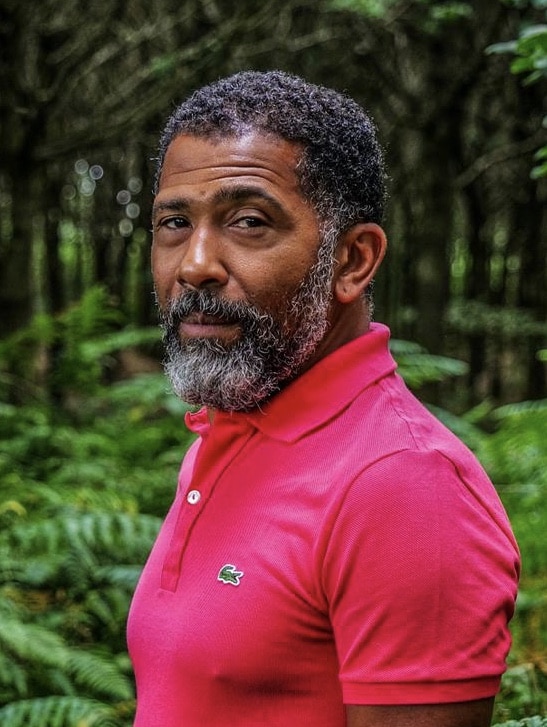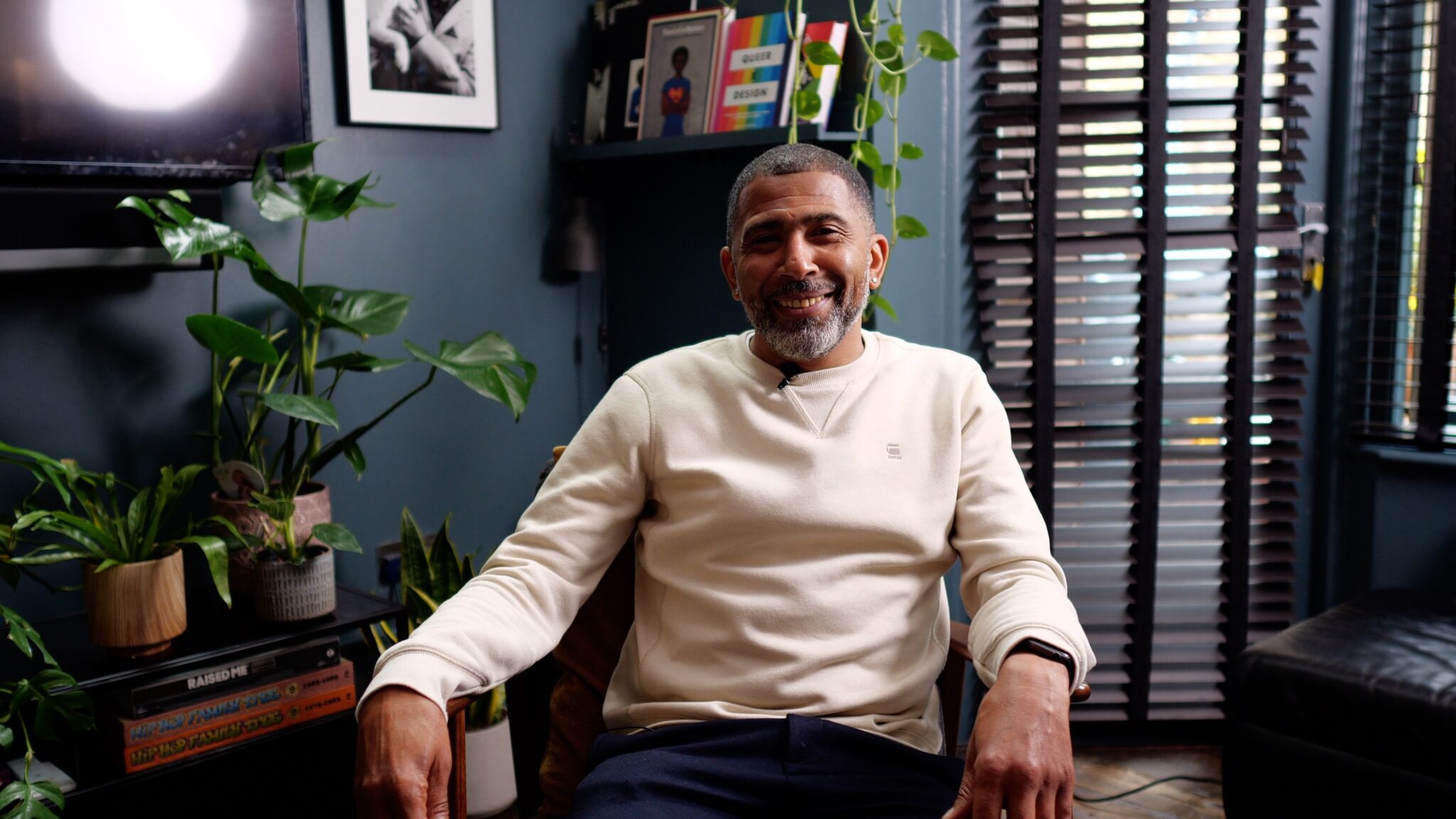Marc Thompson. (Supplied)
As one of Britain’s most prominent HIV activists, Marc Thompson is used to sharing his life story.
Having lived with HIV since 1986, he’s been on the frontlines of social justice activism and education for the decades that have come since. As a result, he’s regularly called upon to speak for history projects, with newspapers and broadcasters, and at events.
Around two years ago, Thompson found himself “struck by the continued whiteness and maleness of these events and the narrative”, he tells PinkNews.
“And it really frustrated me, because I knew that there were lots more stories to be told. There are lots of people who are absent: people of colour, women, people who openly were sex workers. There were people who weren’t living with HIV, but were affected or had been volunteers or clinicians, whose stories were not being captured.”
These vital stories were missing from the modern narrative of the HIV epidemic – partly because, as was the case with last year’s It’s a Sin, those given the platforms to tell such stories are largely white, cis, gay men speaking from their own experience. So, as is his nature, Thompson decided to do something about it.
The outcome is We Were Always Here: an ambitious podcast series for which Thompson and Broccoli Productions collected more than 70 hours of interviews, with more than 50 individuals “who lived through one of the most significant periods in British and global history”.
NEW SERIES🚨
Our new podcast #WeWereAlwaysHere is here! Retelling a history of the UK AIDS pandemic from those most marginalized voices.
Break the ice with host @marct_01. Co-founder of @TeamPrepster & Director @TheLoveTankCICListen to ep 1 🔗 https://t.co/QdoctcYSgQ pic.twitter.com/jbfrqpZmUu
— Broccoli Productions (@BroccoliContent) October 13, 2021
“We now have those narratives for a national archive,” he says. “These are men and women who changed the world. They were volunteers. They were policy makers. They were people who just sat by their boyfriend or their husband or their wife’s bedside. And now we have that now we have that recorded so that in 50, 60 years, a young person, when I’m dead and gone, will go: What happened in the AIDS epidemic? And they can go back and listen to these stories.”
One of the most memorable interviews in the series is with Arnold Gordon, a retired journalist and broadcaster who proudly tells Thompson he’ll be “88 this year”.
A gay man, he recalls visiting Sierra Leone, where he was born, for work in the 80s, and upon his return visiting a close friend of his who had been hospitalised with HIV.
“Nobody would go near him in the hospital, they kept him separately, and he was very upset about that,” Gordon recalls in the podcast. His friend warned him that the then-novel virus was hitting gay people hard, but that gay Black people would be hit “more – and there’s no help for the Black community”.
The Terrence Higgins Trust was, at the time, the only group supporting people with HIV and AIDS in Britain, “but they were very close-knit”. On his deathbed, Gordon’s friend suggested to him that he could do something to help Black people affected by HIV. He went on to found Blackliners, which supported Black and other ethnic minority communities with HIV prevention efforts and support services.
Gordon’s story is inspiring and important – and it seems incredible that his name isn’t up there with our most celebrated of LGBT+ elders. It’s stories like his that Thompson wants to preserve for future generations. Fundamentally it’s about broadening the narrative, creating space for the stories of people who, because they are Black, of colour, women, sex workers, or from another marginalised group, have been excluded – while respecting those whose stories we already know.
“It’s really important to acknowledge that at the height of the epidemic, from say 82 to 92, there were a massive number of cisgender white men, and cisgender men, who were impacted by this,” Thompson says. “I’m not trying to rewrite history, and I don’t want to write my brothers out of it because they were deeply affected and deeply traumatised by what happened. All I’m trying to do is to redress that balance.”

Originally, the podcast was to be called A Very British Epidemic. As well as spotlighting unheard voices, Thompson wanted to interrogate what made the British response to the HIV crisis unique, and what made the UK “ripe for an epidemic to take hold”.
Though COVID put paid to the original title, the series still interrogates these questions. The answer, broadly speaking: “We had a Conservative government which was reactionary, that didn’t believe in society, didn’t believe in gay love. We had a deeply homophobic press and media – in the same way that we’re seeing attacks on trans people today, but in fact the language was even more violent, was even more in your face.
“And there was literal, physical homophobia on the streets. So you had all of these things which were going on, but then what we also had in this country was a National Health Service set up so people didn’t have to pay for care and treatment; we had the Gay Liberation Front, which was was already moving. So we had some sort of roots for us to start tackling this. But we also had quite a puritanical approach to sex and sexuality, which meant that there were barriers to actually talking about the way that this thing was transmitted. So all of these things made it really ripe for an epidemic to happen, but also for the response to happen in a way that did.”
That response was, largely, that communities mobilised while Margaret Thatcher’s government waited until five years after Britain’s first confirmed HIV death to launch a public health campaign. Ultimately, the epidemic set the stage for a broader showdown between the government and the LGBT+ community, culminating in the horrific Section 28, which banned the “promotion” of LGBT+ lives by schools and local authorities.
“What the epidemic did, first of all, is it started to build that momentum, build that movement,” Thompson says. “So when Clause 28 comes along in the late 80s, you’ve already got this powered-up community going: f**k, they’re attacking us over here. We need to fight. You start laying the foundations for some of the political activism that we have today.”
Another unique legacy of the crisis in the UK, Thompson says, was a change in healthcare.
“Healthcare was really paternalistic, top-down, was not community-led. The HIV epidemic, because everybody was ignoring us, we had to create our own [programmes]. So for example, take the Expert Patient [a peer-led support programme for people with long-term conditions]… Because nobody was taking us on board [at the start of the HIV epidemic], we had to learn about our condition. We had to learn how to look after ourselves. So we developed programmes and became expert patients. That is now part of the NHS.”
Forty years on from the start of the epidemic, the landscape of HIV has been transformed. Effective treatment means that people who acquire the virus can live long, happy lives. PrEP, a daily pill, can give protection from HIV. But Thompson believes that “the needs of the most marginalised are still not being met as well as they should be”. His own organisations, Prepster (which was at the forefront of the push for PrEP on the NHS) and Blkout are among those supporting these communities, but more needs to be done.
“Funding is a big reason,” he says. “We don’t have the money invested into sexual health or HIV prevention that we once did. That that’s just a simple fact… But we have the opportunity to do things differently. We have digital now, so it’s easier to get messaging out there. It’s easier to reach those mens’ needs. But it’s not just about prevention messages, it’s also about improving access. It’s about making sure that clinics are accessible to young Black and brown men, so they’re not frightened of going in there, they don’t think they’re going to be outed. Those systemic issues remain, and those are the things that need to change.”
We Were Always Here, by Broccoli Productions, is available on Spotify and other podcast platforms now.
